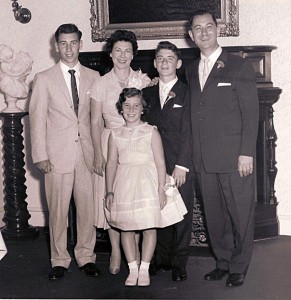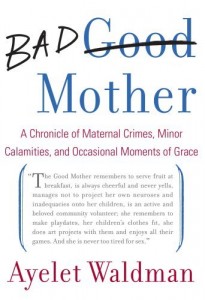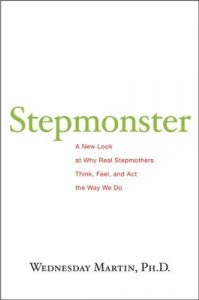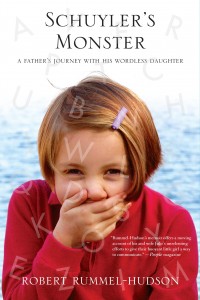|
|
October 14, 2009
 As we were in 1959 Today I interviewed Rachel Simmons for my podcast series: Family Confidential: Secrets of Successful Parenting. (No, it’s not posted yet. Gimme a week or two, ok?) We talked about her must-read new book The Curse of the Good Girl: Raising Authentic Girls with Courage and Confidence and about emotional intelligence. For me, EI (aka EQ) is the ability to:
- identify what you’re feeling
- accept the emotion as it is (without editorializing about your right to feel it)
- express emotion in responsible ways to people who need to hear what you have to say
I’ve immersed myself in this stuff for decades and love talking with people like Rachel, who’ve also made EI their life’s work.
After the interview I recalled a 2003 keynote speech I delivered in Los Angeles. The title: Why 21st Century Kids Need 21st Century Parenting. This feels as good a time as any for a revisit. Here’s a excerpt:
Before we were parents we had parents. People who showed us what it took to be a mom and a dad.
I woke up one morning when I was 5 and heard my mother sobbing behind the door of her room, my father comforting her. My brothers told me that Grandpa had died. A while later, Mom emerged, hair freshly brushed, lipstick bright red. She cheerfully asked what I wanted for breakfast. I wasn’t hungry, I was confused. I wanted to ask about Grandpa, but Mom’s tight smile warned me not to say anything that might upset her. While I pushed a piece of French toast around my plate I had a realization–an absolute epiphany: To be a grown-up means that you have to hide your sadness!
When I was 15 my father died suddenly of a heart attack. His passing left a huge hole in my heart, but instead of grieving I did what I thought grown-ups do, I suppressed my sadness.
Fast-forward 25 years. I’m in the dentist’s chair getting a replacement for an old childhood filling. The doctor pauses in the procedure, gently rests a hand on my head and asks how I’m doing. At his touch a tidal wave of sadness overwhelms me and I start weeping. For the next 48 hours I’m emotionally numb and clueless about what the hell is happening.
David helped me realize that the dentist’s touch had reminded me of my father, who often tousled my hair. With that revelation, the floodgates burst… finally I was able to grieve for my dad. And through my expression of loss I released myself from feelings which held me hostage for decades.
That day I learned about the power of unexpressed emotions. They don’t actually ever go away. Instead, they work like a mild acid, slowly eroding your insides, boring holes in your emotional foundation, creating gaps in your ability to connect with others. I decided not to ever bury feelings that need to be expressed. I vowed to teach my children, through my own example, to express their emotions in healthy ways.
I got my chance soon enough. During most of 1994 my mom was dying of Lou Gehrig’s Disease. Every day I drove an hour each way to visit her. During endless games of Scrabble we finally found the words to communicate with an intimacy we’d never shared before. I am eternally grateful for those last 10 months we had together… grace-filled and excruciatingly painful as they were.
After spending the day with Mom I’d arrive home each night to my own family, scared, stressed, worn down and so raw. I offered no one a lipstick smile. Instead, I trusted that our daughter and son (then ages 15 and 9) would know how to respond to a person in need. And they did. Their backrubs, cups of tea and loving words of encouragement got me through that endless year. I don’t know how I’d have coped if not for David and our sweet kids. If I’d chosen to play the game of “Everything’s fine, honey” I’d have betrayed myself and robbed my children of an opportunity to learn what it means to be a real human being. By sharing the truth of my emotional experience I gave them the chance to exercise their compassion (toward me and their grandmother) and to grow beautifully toward adulthood.
For years we’re on the receiving end of our parents’ choices, observing closely everything they do. As little children we accept that they knew best about what we need. As teens we wonder if they’ve got a clue about who we were or how to parent. After all that watching and evaluating and on the job training with kids of our own, at this point, what could we possibly not know about being a parent?
We know it all, right?

October 5, 2009
 Bad Mother by Ayelet Waldman You’re among friends, so you might as well admit it. When the headlines, cable TV and the blogosphere scream about a bad mother, famous or not, we can’t get enough. And who’s most intent on sucking the marrow out of these kinds of stories? Mothers, of course! We just can’t resist women like Andrea Yates who in the throes of post partum depression, drowned her children in the bathtub. Or Susan Smith who drove hers into a lake allegedly because the man she was dating didn’t like kids. (I’ve wickedly included the links to illustrate how impossible it is not to feed our need to join the Bad Mother Police.)
What’s our fascination with the “bad mother”? Are we’re secretly gloating underneath our horror and disbelief? Do their reprehensible acts make us feel better about the kind of mothers we are?
Maybe the truth is that we’re so uncertain about our ability to measure up to the mythic “Good Mother” that we readily point to the worst mother model around just to give ourselves a little ego boost. “At least I’m not that bad.” And if we really are that insecure about our parenting, how did we get that way? And more to the point, how can we lighten up on ourselves and other women every time a kid has a meltdown in the supermarket?
In this week’s podcast I talk with Ayelet Waldman, author of Bad Mother: A Chronicle of Maternal Crimes, Minor Calamities, And Occasional Moments of Grace.
Back in March 2005 Ayelet wrote an essay for the NY Times in which she stated: “If a good mother is one who loves her child more than anyone else in the world, I am not a good mother. I am in fact a bad mother. I love my husband more than I love my children.”
Today we’re talking with Ayelet about that breakthrough essay, the immediate firestorm it triggered, and where American mothers seem to be today.
Have a listen here:
[QUICKTIME http://www.anniefox.com/podcast/FC009.m4a 300 300 false true]
If you have iTunes, you can subscribe to this podcast in the iTunes Store.
Or, you can download an MP3 version here.
Upcoming guests include:
Rachel Simmons, author of The Curse of the Good Girl: Raising Authentic Girls with Courage and Confidence
Rosalind Wiseman, author of Queen Bees & Wanna Bees and Queen Bee Moms & Kingpin Dads
Diane Peters Mayer, author of Overcoming School Anxiety
Izzy Rose, author of The Package Deal: My (not-so) Glamorous Transition from Single Gal to Instant Mom
Diane E. Levin, co-author (with Jean Kilbourne) of So Sexy So Soon: The New Sexualized Childhood And What Parents Can Do to Protect Their Kids
Susan M. Heim, author of It’s Twins! and Chicken Soup for the Soul Twins and More
Hannah Friedman, author of Everything Sucks: Losing My Mind and Finding Myself in a High School Quest for Cool
Dara Chadwick, author of You’d Be So Pretty If…
*What’s a podcast? “A podcast is a series of digital media files, usually either digital audio or video, that is made available for download via web syndication.” –Wikipedia… So, in this case, there’s an audio file for you to listen to (in addition to reading the above).

September 7, 2009
 Stepmonster by Wednesday Martin When you think about stepmothers, what comes to mind? For me it’s that heartless woman whose idea of a family outing was to take Hansel and Gretel into the woods and abandon them…twice. Then there’s the callous, opportunistic bitch who fleeced Cinderella’s dad for all he was worth then treated her stepdaughter like a slave in her own home. And let’s not forget that ultimate charmer, so narcissistic and jealous of Snow White she order a hit on the girl. “Cut out her heart and bring it to me in this box!”
Geez! With stepmoms like that it’s no wonder we grow up with such fear and loathing for women who marry men with children. But with 43% of first marriages ending in divorce and so many subsequent remarriages, the likelihood of a child having a real stepmother is relatively high.
So what’s really inside the hearts and minds of stepmoms? Are they as powerful and conniving as we’ve been led to believe? And if so, then why are they blamed for so much that goes wrong in their families? And why are they given so little credit for their sincere efforts to be a positive force in the lives of their husbands and stepchildren? Fair questions that deserve answers.
In this week’s podcast I talk with Wednesday Martin, author of Stepmonster: A New Look At Why Stepmothers Think, Feel And Act The Way We Do. We get into the fact vs. the fantasy of real stepmoms from someone who has walked the walk and done her homework inside and outside of the family. Every woman who married a man with children or is considering it, needs to hear this one! Men who brought a stepmom into the lives of their kids, don’t want to miss it either.
Have a listen here:
[QUICKTIME http://www.anniefox.com/podcast/FC008.m4a 300 300 false true]
If you have iTunes, you can subscribe to this podcast in the iTunes Store.
Or, you can download an MP3 version here.
Resources suggested by Wednesday Martin:
Upcoming guests include:
Ayelet Waldman, author of Bad Mother: A Chronicle of Maternal Crimes, Minor Calamities, And Occasional Moments of Grace
Diane Peters Mayer, author of Overcoming School Anxiety
Izzy Rose, author of The Package Deal: My (not-so) Glamorous Transition from Single Gal to Instant Mom
Diane E. Levin, co-author (with Jean Kilbourne) of So Sexy So Soon: The New Sexualized Childhood And What Parents Can Do to Protect Their Kids
Susan M. Heim, author of It’s Twins! and Chicken Soup for the Soul Twins and More
Rachel Simmons, author of The Curse of the Good Girl: Raising Authentic Girls with Courage and Confidence
Hannah Friedman, author of Everything Sucks: Losing My Mind and Finding Myself in a High School Quest for Cool
*What’s a podcast? “A podcast is a series of digital media files, usually either digital audio or video, that is made available for download via web syndication.” –Wikipedia… So, in this case, there’s an audio file for you to listen to (in addition to reading the above).

August 16, 2009
 ''Schuyler's Monster: A Father’s Journey with His Wordless Daughter'' by Robert Rummel-Hudson All living things, with the exception of clones and genetically engineered corn and soybeans, are unique. Of course that includes children. Every kid has a collection of traits, quirks, interests, annoying habits, talents and abilities that makes him or her truly special. That’s why education should be “special” for every child. Unfortunately it’s not. Far from it.
In spite of the “Everyone turn to page 57 in your math book” approach to learning that is so 20th century and still going strong, typical children will muddle through their K-12 years and come out the other end having succeeded to one degree or another.
But for the millions of “special needs kids” who are entitled by law to receive truly special education, many are being grossly short-changed. Why? Crippling state budget cuts aside, the crux of the problem is sometimes in the approach of educators who prejudge a child’s ultimate learning potential and design programs based on what a special needs student “can’t” do rather than acknowledging what he or she may not be able to do “yet.” Education is about opening doors. No one can map out the limits of any child’s potential. That boundary line has been drawn yet.
All kids need parents to advocate for them. Special needs kids need especially loud and pushy parents to go to bat for them at school and help them get what they require to succeed.
In this week’s podcast I talk with Robert Rummel-Hudson author of Schuyler’s Monster: A Father’s Journey With His Wordless Daughter. We talk candidly about his daughter Schuyler, born with a rare neurological disorder that makes language acquisition extremely difficult. We discuss the challenges of connecting with a special needs child and the obstacles parents often encounter when dealing with schools. We also talk about what every parent of a special needs child needs to know in order to be your child’s most ferocious and unyielding advocate.
Have a listen here:
[QUICKTIME http://www.anniefox.com/podcast/FC007.m4a 300 300 false true]
If you have iTunes, you can subscribe to this podcast in the iTunes Store.
Or, you can download an MP3 version here.
Upcoming guests include:
Wednesday Martin, author of Stepmonster: A New Look At Why Stepmothers Think, Feel And Act The Way We Do
Ayelet Waldman, author of Bad Mother: A Chronicle of Maternal Crimes, Minor Calamities, And Occasional Moments of Grace
Izzy Rose, author of The Package Deal: My (not-so) Glamorous Transition from Single Gal to Instant Mom
Diane E. Levin, co-author (with Jean Kilbourne) of So Sexy So Soon: The New Sexualized Childhood And What Parents Can Do to Protect Their Kids
Rachel Simmons, author of The Curse of the Good Girl: Raising Authentic Girls with Courage and Confidence
Special thanks to our friend and musician/composer Curt Siffert who let us use his song, “Broken Frost” for the opening of this podcast.
*What’s a podcast? “A podcast is a series of digital media files, usually either digital audio or video, that is made available for download via web syndication.” – Wikipedia… So, in this case, there’s an audio file for you to listen to (in addition to reading the above).
 — Older Posts »
| |















